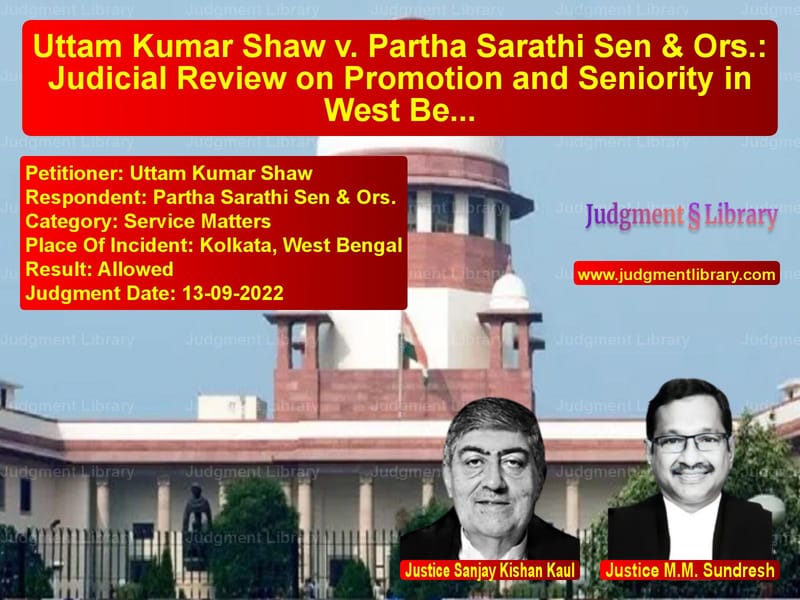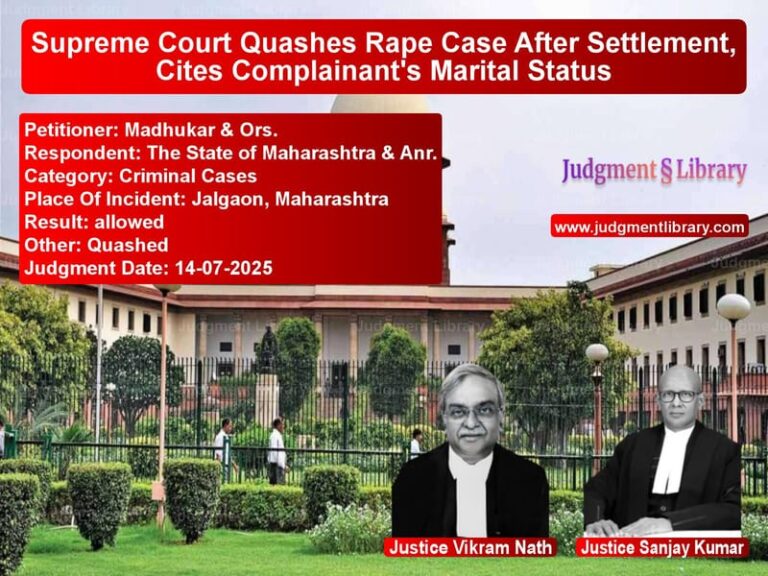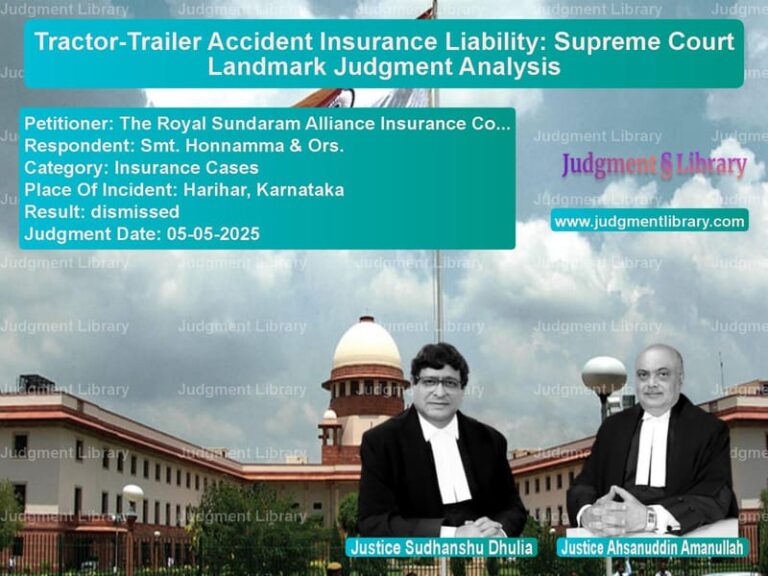Uttam Kumar Shaw v. Partha Sarathi Sen & Ors.: Judicial Review on Promotion and Seniority in West Bengal Judicial Services
The case of Uttam Kumar Shaw v. Partha Sarathi Sen & Ors. involves a legal dispute concerning the promotion, seniority, and eligibility of Uttam Kumar Shaw for appointment to the West Bengal Higher Judicial Services (WBHJS). The appellant, Uttam Kumar Shaw, contested the findings of the High Court of Calcutta regarding the drafting of the gradation list and seniority among officers of the West Bengal Judicial Services. The appeal centered on whether the appellant was entitled to a promotion to the position of District Judge (Entry Level) based on the vacancies that arose between 2004 and 2008, and whether he was wrongly placed below others promoted in 2009.
The facts of the case trace back to 2003 when the appellant, Uttam Kumar Shaw, had been found suitable for promotion to the rank of West Bengal Higher Judicial Services. On December 24, 2003, a communication from the High Court’s Full Court notified that he was deemed suitable for promotion to the higher judicial services. This promotion was followed by his posting as a Fast Track Judge in West Bengal. However, as the years passed, new rules, namely the West Bengal Judicial (Conditions of Service) Rules, 2004, came into force, which redefined the conditions of seniority and promotions within the judicial cadre, introducing a new roster system.
During the period from 2004 to 2008, the appellant was eligible for a promotion to the District Judge (Entry Level) position, as several vacancies had arisen. However, despite being eligible, the vacancies were filled late in 2009 through direct recruitment and limited competitive examinations, bypassing the appellant and other senior judges in the lower cadre. Subsequently, a draft gradation list was prepared in 2011, which placed the appellant below those recruited and promoted in 2009, even though he had been deemed eligible for promotion in the earlier period. The appellant contested the draft gradation list, arguing that the delay in the promotion process, as well as his placement below the newly appointed officers, was unfair and unjust.
In response to the appellant’s plea, the High Court ruled in 2013 that the gradation list had to be revised, and a new list would be published to account for the vacancies that occurred between 2004 and 2008. The appellant’s contention was that as per the earlier administrative decisions, he should have been considered for promotion before the 2009 recruits, but the new rules and the High Court’s decision had placed him behind them. The appellant’s counsel, in his submissions, emphasized that the delays in promotion were not his fault, and the new recruits should not have been placed ahead of the appellant in terms of seniority.
In 2016, a new draft gradation list was published, reflecting the appellant’s concerns. This draft list was intended to adjust the seniority based on the vacancies arising between 2004 and 2008. However, the appellant argued that the implementation of the list was still flawed, and that the 2009 recruits were given undue seniority over those who had been eligible earlier. This resulted in further litigation, which eventually found its way to the Supreme Court of India.
The Supreme Court, upon reviewing the case, examined several important factors, including the fairness of the promotion process and the retrospective application of the rules. The Court considered the appellant’s argument that the delay in promotion was caused by the administrative inaction of the High Court, and that the appellant should have been promoted earlier in line with the vacancies that arose between 2004 and 2008. The Court also took into account the changes in the judicial rules and the new roster system, which had altered the manner in which promotions were to be handled.
The respondent’s counsel, representing the State of West Bengal, argued that the High Court’s decision to revise the gradation list was in line with the rules of seniority and the 40-Point Roster System, and that the appellant had no right to claim promotion ahead of the 2009 recruits. They emphasized that the appellant’s promotion had been delayed due to administrative reasons, but that the new recruits were duly appointed in accordance with the rules, and there was no violation of the appellant’s rights.
The Supreme Court, in its judgment, emphasized the need for fairness and equity in the promotion process. The Court recognized that the appellant had been in a position of seniority based on his years of service, but that the delay in filling vacancies and the confusion arising from the new rules had led to the current situation. The Court observed that the High Court had been justified in its decision to revise the gradation list, but that the appellant’s promotion to the District Judge (Entry Level) should not be delayed any further.
The Supreme Court ultimately allowed the appellant’s appeal, ruling that the appellant was entitled to be considered for promotion based on the vacancies that occurred between 2004 and 2008. The Court directed the High Court and the State Government to give effect to the revised gradation list within 12 weeks, ensuring that the appellant’s rightful place in the seniority list was recognized. The Court also noted that the decision would not have any bearing on the officers who were promoted in 2009, as they were not parties to the case.
This case highlights the complexities involved in the judicial promotion process, particularly when there are delays in filling vacancies and the implementation of new rules. It underscores the importance of ensuring fairness and transparency in the promotion system, while also recognizing the legitimate claims of senior officers who have been affected by administrative delays. The judgment serves as a reminder of the need for timely and just promotions in the judicial system and the importance of adhering to established procedures.
Petitioner Name: Uttam Kumar Shaw.Respondent Name: Partha Sarathi Sen & Ors..Judgment By: Justice Sanjay Kishan Kaul, Justice M.M. Sundresh.Place Of Incident: Kolkata, West Bengal.Judgment Date: 13-09-2022.
Don’t miss out on the full details! Download the complete judgment in PDF format below and gain valuable insights instantly!
Download Judgment: uttam-kumar-shaw-vs-partha-sarathi-sen-&-supreme-court-of-india-judgment-dated-13-09-2022.pdf
Directly Download Judgment: Directly download this Judgment
See all petitions in Employment Disputes
See all petitions in Promotion Cases
See all petitions in Public Sector Employees
See all petitions in Workplace Harassment
See all petitions in Termination Cases
See all petitions in Judgment by Sanjay Kishan Kaul
See all petitions in Judgment by M.M. Sundresh
See all petitions in allowed
See all petitions in supreme court of India judgments September 2022
See all petitions in 2022 judgments
See all posts in Service Matters Category
See all allowed petitions in Service Matters Category
See all Dismissed petitions in Service Matters Category
See all partially allowed petitions in Service Matters Category







